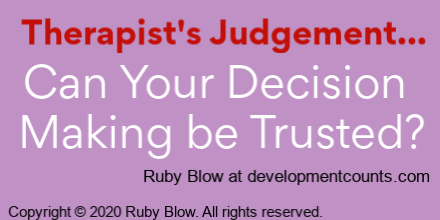Three Types of Therapist’s Self Disclosure
There are various types of a therapist’s self disclosure.
- Some self disclosure is about the therapist’s personal history like family, relationships, and trauma.
- Another form is about the therapist’s values, which is something that might be disclosed at the outset of therapy if those values have an impact on therapeutic focus or therapeutic process.
- Another form of self disclosure is about the therapist’s genuine emotions and reactions in the moment of therapeutic process with their clients.
All self disclosures from a therapist do not have the same intent or the same impact.
Self Disclosure about the Therapist’s Personal History
If I could break this discussion down to the “good, bad and ugly”… therapist’s self disclosure about their own personal history would be the “bad.” When I hear about this type of disclosure from a therapist it is my impression that they may not trust the process of therapy.
Sometimes beginning counselors make this type of disclosure because they are trying to demonstrate their competence to the client. They are trying to say, “See? This is why you can trust me,” or “This is why I do understand you,” instead of relying on their competence to illustrate the point. They don’t trust that their competence can best be demonstrated in their attending skills…their relationship skills as a therapist. Instead, they revert to the relationship skills utilized in non-therapeutic relationships. This can best be described as “I’ll show you mine if you show me yours.”
When experienced therapists do this, I believe it is a remnant from a crutch – developed as a therapy tactic – while early in their professional development. They continue to do it because it is what they have always done. Perhaps a few clients have said that they appreciate their stories and that may be true. However, those clients did not get a chance to experience their therapeutic relationship any other way.
Some therapists will read this and perhaps feel defensive. They would argue that self disclosure has brought them closer to their clients. There may be some truth that argument. But at what cost?
If self disclosures about the therapist’s personal history (such as family, relationships, traumas, etc.) are leveraged to build the therapeutic relationship, then the client either:
- comes to expect it and even feel entitled to it;
- wishes their therapist would not do it but they don’t want to “hurt” their therapist’s feelings (something a client should never have to worry about);
- demonstrates a benign indifference as if to say “What does this have to do with me?” and therein lies the point… It has nothing to do with them.
If possible, I recommend that therapists remove this type of self disclosure from the therapeutic tool kit. We should not encourage clients to compare our lives to theirs.
Self Disclosure about the Therapist’s Values
Disclosure about the therapist’s values can be an essential element of informed consent. It would be the “good” of self disclosure. Some therapists are clearly holding certain values as guiding principles of therapy. The client has a right to know about those values.
Whether it be a type of religious or spiritual element that the therapist incorporates into their work or values that impact their perspectives about change, healing, health, personal development and other factors that impact therapy.
Therapists are supposed to develop awareness of the values they hold that could impact their clients. Those values are to be monitored so that they are not imposed. Clients are supposed to have a choice. They need the opportunity to say “Yes, that is okay for me” or “No, I’d rather not work from that perspective.”
Therapists must practice self monitoring and self awareness. It is vital to not “push” an agenda onto the client.
- We must monitor ours and our client’s tone, body language and general self expression.
- The therapist must ask, “Am I respecting the client’s autonomy?”
- “Am I supporting the client in their highest good, according to their own values?”
Even though this is the “good” it is not “the easy.” But it is vital for a competent and ethical practice. Therapists must develop self awareness but be cautious about “self centered-ness.”
Self Disclosure about Therapist’s Genuine Emotions and Reactions
The truth is self disclosure about the therapist’s genuine emotions and reactions in therapy are vital therapeutic skills. It is about immediacy. It is about being in the moment and about being in alignment with one’s thoughts, feelings and actions.
This could be categorized as the “ugly,” but only because it can be raw and vulnerable for both parties. It is the heart of the matter…it includes those times when you find yourself tearful with the client. It includes sitting with painful content and holding a safe space for another person to share how they were betrayed, hurt, abused, neglected or even how much they dislike themselves…all of the times when you as the therapist have to try not to “save”, but where you must absolutely be fully present and reflect the hurt and pain that you experience just hearing their story.
There is power in witnessing someone’s reality. That power transfers to the client who may be validated for the first time that their feelings matter and that their experiences and what remains are justified.
The caution here is that we (Therapists) can’t be so much in our reactions that we take over the session with our feelings instead of the client’s.
You are Known to the Client in the Ways that Matter Most
On occasion a life disclosure is exchanged – such as in parting when the client asks or states “I hope you have something fun planned for the holidays.” The therapist might respond with a brief detail…like “I am going out of town to ______ to visit my sister.”
Naturally, over the life of a long term therapeutic relationship (years), clients will learn more about us…but as this occurs it is already in a structured context. It is already in the safe bounds that the client knows that your work is about them and their concerns. At the same time, the length of the therapeutic relationship does not mean we can be lackadaisical. It is important to watch your motives. Are you getting your relationship and emotional intimacy needs met through your therapeutic relationships?
As Therapists, we need to be in our own therapy and/or have friends who are therapists. We need to be in meaningful and depth-ful relationships outside of therapy. Relationships that involve emotional intimacy where we can self disclose and be heard and be cared for by others.
It is important to remember that we are known to our clients in the ways that matter most. They know our humor, our values; they know our hearts.
Copyright © 2017 Ruby Blow. All rights reserved.
Share your thoughts on Linkedin, Facebook, Twitter or log in to one of your accounts below to comment. Subscribe to my YouTube channel.





